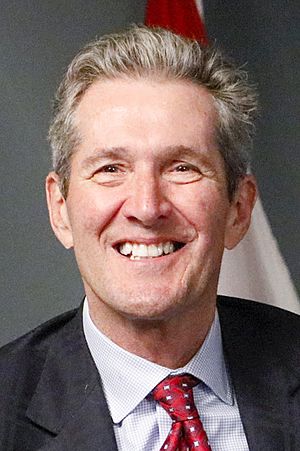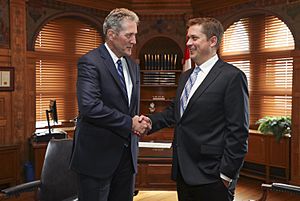Brian Pallister facts for kids
Quick facts for kids
Brian Pallister
|
|
|---|---|
 |
|
| 22nd Premier of Manitoba | |
| In office May 3, 2016 – September 1, 2021 |
|
| Monarch | Elizabeth II |
| Lieutenant Governor | Janice Filmon |
| Deputy | Heather Stefanson Kelvin Goertzen |
| Preceded by | Greg Selinger |
| Succeeded by | Kelvin Goertzen |
| Leader of the Opposition in Manitoba | |
| In office July 30, 2012 – May 3, 2016 |
|
| Preceded by | Hugh McFadyen |
| Succeeded by | Flor Marcelino |
| Leader of the Progressive Conservative Party of Manitoba | |
| In office July 30, 2012 – September 1, 2021 |
|
| Deputy | Heather Stefanson Kelvin Goertzen |
| Preceded by | Hugh McFadyen |
| Succeeded by | Kelvin Goertzen (interim) |
| Member of the Legislative Assembly of Manitoba for Fort Whyte |
|
| In office September 4, 2012 – October 4, 2021 |
|
| Preceded by | Hugh McFadyen |
| Succeeded by | Obby Khan |
| Member of the Legislative Assembly of Manitoba for Portage la Prairie |
|
| In office September 15, 1992 – April 28, 1997 |
|
| Preceded by | Edward Connery |
| Succeeded by | David Faurschou |
| Member of Parliament for Portage—Lisgar |
|
| In office November 27, 2000 – October 14, 2008 |
|
| Preceded by | Jake Hoeppner |
| Succeeded by | Candice Bergen |
| Minister of Government Services | |
| In office May 9, 1995 – January 6, 1997 |
|
| Premier | Gary Filmon |
| Preceded by | Gerry Ducharme |
| Succeeded by | Frank Pitura |
| Personal details | |
| Born |
Brian William Pallister
July 6, 1954 Portage la Prairie, Manitoba, Canada |
| Political party | Progressive Conservative Party of Manitoba |
| Other political affiliations |
Progressive Conservative Party of Canada (before 2000) Canadian Alliance (2000–2003) Conservative Party of Canada (2003–present) |
| Spouse | Esther Johnson |
| Children | 2 |
| Education | Brandon University (BA, BEd) |
Brian William Pallister (born July 6, 1954) is a Canadian politician. He was the 22nd premier of Manitoba from 2016 to 2021. A premier is like the leader of a province. He also led the Progressive Conservative Party of Manitoba from 2012 to 2021. Before that, he was a government minister in Manitoba and a member of the Canadian Parliament from 2000 to 2008.
Contents
Early Life and Education
Pallister was born in Portage la Prairie, Manitoba. His parents were Anne Ethel (Poyser) and Bill Pallister. He studied at Brandon University. There, he earned degrees in Arts and Education.
From 1976 to 1979, he worked as a high school teacher in rural Manitoba. He also represented his fellow teachers in their local union. Later, he became a financial expert. Pallister is also a good curler. He won the provincial mixed curling championship in 2000.
Starting in Provincial Politics
Pallister began his political journey in Manitoba. He won a special election in Portage la Prairie on September 15, 1992. He was a candidate for the Progressive Conservative Party of Manitoba.
He became a member of the provincial legislature. He supported the government led by Gary Filmon. Pallister pushed for laws that would help balance the government's budget. In 1993, he supported Jean Charest to become the leader of the federal Progressive Conservative Party.
Becoming a Minister
Pallister was re-elected in the 1995 provincial election. On May 9, 1995, he became the Minister of Government Services. This meant he was in charge of many government operations.
He worked to make government rules simpler. He also helped with changes to the Manitoba Disaster Assistance Board. This board helps people after natural disasters. He left his role as minister on January 6, 1997. He did this to prepare for his first campaign for federal politics.
Pallister then tried to become a federal politician. He ran for the Progressive Conservative Party in Portage—Lisgar. However, he lost to Jake Hoeppner in the 1997 federal election.
Moving to Federal Politics
Running for Party Leader
In 1998, Pallister ran to become the leader of the federal Progressive Conservative Party. He wanted to bring back voters who had left the party. He finished fourth in the leadership election. Joe Clark, a former Prime Minister, won the leadership. Pallister felt the party missed a chance to change.
Joining the Canadian Alliance
In July 2000, Pallister decided to run in the next federal election. He wanted to represent both the Progressive Conservative and Canadian Alliance parties. However, the Progressive Conservative leader, Joe Clark, did not agree.
So, Pallister left the Progressive Conservatives. He joined the Canadian Alliance on August 17, 2000. He won his party's nomination for Portage—Lisgar.
Becoming a Member of Parliament
Pallister was elected to the House of Commons of Canada in the 2000 general election. He won by a large number of votes. He served as a member of the opposition.
The Canadian Alliance and Progressive Conservative parties later joined together. This created the Conservative Party of Canada on December 7, 2003. Pallister became a member of this new party. He thought about running for its leadership but instead supported Stephen Harper.
Pallister was easily re-elected in the 2004 election. In July 2004, he became a critic for National Revenue. This meant he watched over how the government collected taxes.
Speaking Out on Spending
In September 2005, Pallister became well-known for pointing out spending issues. He highlighted problems with how the head of the Royal Canadian Mint spent money. The head of the Mint resigned after these issues became public.
Pallister was re-elected again in 2006. The Conservatives formed a minority government. Pallister asked Prime Minister Stephen Harper not to make him a cabinet minister. He wanted time to decide if he would return to provincial politics.
On February 17, 2006, he announced he would stay a federal Member of Parliament. He became the head of the House of Commons Finance committee. Later, he was appointed as a special assistant to the Minister of International Trade. In January 2008, he announced he would not run in the next federal election.
Back to Provincial Politics

Leading the Progressive Conservatives
After the 2011 provincial election, Hugh McFadyen stepped down as leader of the Progressive Conservative Party of Manitoba. On April 11, 2012, Pallister announced he wanted to be the new leader. On July 30, 2012, he became the leader without anyone else running against him.
Two months later, he easily won a special election for McFadyen's old seat in Fort Whyte.
While he was the opposition leader, Pallister made some comments that caused debate. In 2013, he called atheists "infidels" in a holiday message. He later said he did not mean to offend anyone. In 2014, he compared a tax increase to Halloween, saying Halloween was bad for children. This video became popular online later.
Winning the 2016 Election
In April 2016, a news report showed that Pallister had traveled to Costa Rica many times. He had spent about 240 days there since 2012.
Pallister's party was popular in opinion polls for almost four years. The previous government had raised the provincial sales tax after promising not to. Pallister led his party to a big win in the election on April 19, 2016. They won 40 out of 57 seats. This was the largest majority government in Manitoba's recent history. He became the first Progressive Conservative premier since 1999.
Premier of Manitoba (2016–2021)
Pallister and his team officially took office on May 3, 2016. He led his party to win re-election in 2019, though with a slightly smaller majority.
Economic Changes
Helping with Housing
In June 2019, Pallister's government joined a national housing plan. This plan promised to invest almost $450.8 million over 10 years. The money would help expand and fix social and community housing in Manitoba. Both the provincial and federal governments shared the cost.
Sales Tax Adjustments
Pallister's government lowered Manitoba's provincial sales tax (PST) from 8 percent to 7 percent in 2019. This change started on July 1. In 2021, his government also removed the PST from personal services like haircuts.
Carbon Tax Stance
Pallister, like other conservative leaders, was against the federal carbon tax. In 2019, his government challenged it in court. On March 25, 2021, the Supreme Court of Canada ruled that the federal carbon tax was legal. Pallister said Manitoba would continue to challenge it.
Leading During COVID-19
Pallister led Manitoba's response to the COVID-19 pandemic in Manitoba. In December 2020, he received attention for asking people to follow social distancing rules. However, many people in Manitoba felt the province's response was too slow. They believed the government waited too long to increase restrictions. This led to a rapid spread of the virus in October and November 2020.
Critics blamed the rise in cases on Pallister's plan to reopen the economy. They said this went against advice from many doctors. Pallister faced similar criticism during the third wave of the virus in May 2021. Changes to public health rules came weeks after some critics asked for them. The slow response led to a shortage of intensive care unit beds. Some patients had to be moved to hospitals in other provinces.
Working with Indigenous Communities
On July 7, 2021, Pallister caused controversy with comments about colonial settlers. He said that people who came to Canada "didn't come here to destroy anything. They came here to build." These comments led to his Minister of Indigenous Reconciliation resigning. Her replacement also caused controversy by defending the residential school system. Weeks later, Pallister apologized for his comments. However, many First Nations chiefs felt his apology was not enough.
Stepping Down as Premier
On August 10, 2021, Pallister announced he would resign as Premier on September 1. He also said he would not run in the next provincial election. Deputy Premier Kelvin Goertzen became the interim leader and officially took over as premier on September 1. Pallister left his seat in the legislature on October 4. Heather Stefanson was chosen as Pallister's permanent replacement on October 30. She became premier on November 2.
Images for kids
 | Jewel Prestage |
 | Ella Baker |
 | Fannie Lou Hamer |


